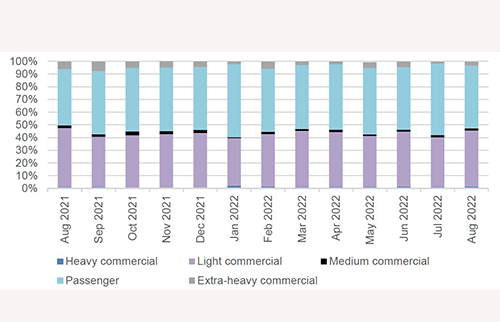Although Namibian vehicle sales rebounded significantly by over 55% during August 2022, a local economist has cautioned this figure could be artificially inflated by rental companies who have been replenishing their fleets.
Vehicle sales are usually an excellent barometer of economic activity.
Overall, domestic vehicles sales rebounded by double digits in August from the number of units sold during July, rising by 55.2% month-on-month (m/m) according to the National Association of Automobile Manufacturers of South Africa (NAAMSA).
The latest NAAMSA figures indicate a total of 1 051 vehicles were sold during August 2022, compared to 677 units in July 2022 and 762 in August 2021.
According to Theo Klein, an economist at Simonis Storm, car rental companies typically buy new units for their fleets during Namibia’s peak tourist season, which is from May to August.
“Vehicles purchased by rental companies have been delayed due to global stock shortages and this postpones upscaling the fleet of certain rental companies responding to heightened demand from tourists. Therefore, the usual pattern of seeing a higher number of vehicle sales have been slightly disrupted in the recent peak tourist season,” Klein
stated.
This August’s vehicle sales figure is the second highest number of vehicles sold in a single month since May 2019. Klein noted that on an annual basis, vehicle sales increased by 37.9% year-on-year (y/y) in August 2022, surging past its six-month moving average. Klein also pointed out that heavy commercial and passenger vehicles experienced the largest annual increases in sales during August 2022.
“As usual, passenger and light commercial vehicles had the largest share of units sold in August 2022 with a 49.4% and 44.2% share of all units sold respectively. On a monthly basis, extra-heavy and heavy commercial vehicles recorded the largest declines in sales,” Klein stated.
Meanwhile, New Era recently reported that rising global prices of vehicle components and an increase in energy production costs was likely to result in continued price increases for vehicles in Namibia. This, in turn, was expected to make it more expensive to purchase and operate cars for Namibians.
This depressive state of affairs was brought to the fore by Simonis Storm, which expected demand for new vehicles to start retreating, particularly as interest rates are still on an upward trajectory.
In previous reports, Simonis Storm cautioned that local car prices were likely to rise by between 3% to 5% per quarter, following discussions with various brands in Windhoek. A previous report by the stock brokerage noted that European carmakers registered the lowest number of new vehicle sales during June 2022 since 1996.
This was according to data released by the European Automobile Manufacturers’ Association, showing vehicle sales decreased by 17% y/y in June 2022, with Volkswagen incurring the largest decline of 24% y/y.
While manufacturers such as BMW AG, Volkswagen and Mercedes AG indicated in May 2022 that semiconductor shortages eased, this was expected to still take time for increased production and supply to reach global dealers with stock.
Simonis Storm further mentioned that geopolitics could be driving higher car prices as certain brands relocate their value chains, as following the conflict in Ukraine, Renault sold its 68% stake in AvtoVaz (a state-backed entity in Russia) for one Russian Ruble.
Also, Jeep announced in July 2022 it will close its plant in China, according to Bloomberg Intelligence. As such industry insiders warned that a potential war between Taiwan and China could see global supplies of semiconductors tumble.
“Globally, car manufacturers are still facing high raw material and energy costs, which contribute to vehicle price increases. Car prices have also increased across the world as carmakers focus their limited production on their most expensive and profitable models. In addition, energy shortages and potential energy rationing in Germany are driving concerns of plant shutdowns, worsening stock shortages globally,” read Simonis Storm’s vehicle sales report for July 2022.


